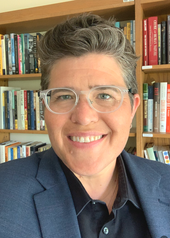
I teach at the George Washington University Law School and (by courtesy) in the Sociology Department. In 2023–24, am a Visiting Scholar at the Russell Sage Foundation. I have a JD and a PhD and am a former sociology professor at the University of Massachusetts, Amherst.
My main area of research is access to justice. I study how ordinary people think about and understand law (sometimes called "legal consciousness"), and how these patterns affect their ability to solve their problems. I designed and administered the Survey of Everyday American Legality (SEAL), and the first article from that project came out last year. As part of that study, I am using in-depth longitudinal interviews with a subset of survey respondents to understand how people navigate civil justice challenges over time.
My other research focuses on developing a better empirical understanding of legal education, including How to Be Sort of Happy in Law School (Stanford University Press, 2018). In 2020, I launched a longitudinal study that follows more than 50 law students from all over the U.S., beginning before they started law school and continuing to the present time, and using multiple surveys and in-depth interviews to develop a comprehensive understanding of their law school experiences.
My other work looks at a number of areas related to law and society, including rights assertion in constitutional criminal procedure, parole for lifer inmates, illegal cockfighting, and voir dire for LGBTQ+ jurors. My research has been published in the Harvard Law Review, California Law Review, Fordham Law Review, UC Irvine Law Review, Law & Society Review, Social Forces, Law & Social Inquiry, and many other law reviews and peer-reviewed journals.
My main area of research is access to justice. I study how ordinary people think about and understand law (sometimes called "legal consciousness"), and how these patterns affect their ability to solve their problems. I designed and administered the Survey of Everyday American Legality (SEAL), and the first article from that project came out last year. As part of that study, I am using in-depth longitudinal interviews with a subset of survey respondents to understand how people navigate civil justice challenges over time.
My other research focuses on developing a better empirical understanding of legal education, including How to Be Sort of Happy in Law School (Stanford University Press, 2018). In 2020, I launched a longitudinal study that follows more than 50 law students from all over the U.S., beginning before they started law school and continuing to the present time, and using multiple surveys and in-depth interviews to develop a comprehensive understanding of their law school experiences.
My other work looks at a number of areas related to law and society, including rights assertion in constitutional criminal procedure, parole for lifer inmates, illegal cockfighting, and voir dire for LGBTQ+ jurors. My research has been published in the Harvard Law Review, California Law Review, Fordham Law Review, UC Irvine Law Review, Law & Society Review, Social Forces, Law & Social Inquiry, and many other law reviews and peer-reviewed journals.